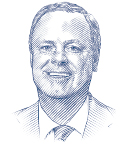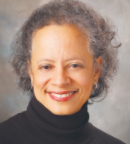When I chose my Presidential theme for the 2020 ASCO Annual Meeting, “Unite and Conquer: Accelerating Progress Together,” in early 2019, I never imagined it would take on a new meaning 12 months later. The world is grappling with the COVID-19 pandemic, and, even as we practice social distancing, I can say I’ve never felt the global oncology community more united than it is now.

Howard A. ‘Skip’ Burris III, MD, FACP, FASCO
In the face of this pandemic, oncology researchers are organizing to study what COVID-19 means for our patients. They are coming together to exchange best practices and patient care guidance. Oncology practices are adapting quickly to implement telemedicine. And, in a role reversal, patients are offering health-care workers words of comfort. It’s clear we are all united in our determination to deliver the best possible care for patients with cancer and to make progress against this disease despite every challenge.
The responses are remarkable, but I’m not at all surprised. It did not take a global health crisis to unite our community. At ASCO, we’ve long been united in our mission to reduce the global burden of cancer through research, education, and promotion of the highest-quality patient care. As I conclude my tenure as ASCO President and pass the torch to President-Elect Lori J. Pierce, MD, FASTRO, FASCO, I want to take a moment to reflect on some of the progress we have made this year, both as a Society and in the care of our patients.

Lori J. Pierce, MD, FASTRO, FASCO
United for Global Oncology
ASCO’s strategic plan calls for us to strengthen the Society’s global reach to better serve our international members and partners. Enter ASCO’s inaugural international meeting, ASCO Breakthrough: A Global Summit for Oncology Innovators. Held in Bangkok this past October, Breakthrough was our first global conference, attracting nearly 500 attendees from more than 30 countries. The program attracted participants from a variety of disciplines, including information and computer science, artificial intelligence, basic and translational research, social media, and biomedical engineering. Plans are already underway as we look to bring the Breakthrough meeting to Japan in 2021.
United for Access to Care
This past fall, ASCO members from 35 states held more than 160 congressional meetings, urging members of Congress to take action to advance policy priorities that improve patient access to cancer care and clinical trials. Through our new Association for Clinical Oncology, ASCO mobilized a coalition in support of passage of the bipartisan CLINICAL TREATMENT Act (HR 913). The bill requires state Medicaid programs to cover routine medical costs associated with participation in clinical trials, including physician visits and laboratory studies, making it possible for more patients with life-threatening diseases, especially underrepresented minorities, to have access to scientific advances in treatment. The bill is expected to pass this year.
United for Progress
This year’s Clinical Care Advances (CCA) 2020: ASCO’s Annual Report on Progress Against Cancer named Refinement of Surgical Treatment of Cancer as ASCO’s 2020 Advance of the Year. The report is a culmination of the incredible strides we’re making, and it illustrates how progress drives more progress. With all the emphasis on the many novel agents and targeted therapies now available to treat patients, it is nice to step back and appreciate how far we have come with what is still a primary means of curing some patients’ cancers through the surgical removal of their disease.
I also want to acknowledge the impact that Conquer Cancer® The ASCO Foundation has had in supporting researchers who are making meaningful breakthroughs in clinical research and care. Eight clinical care advances highlighted in our 2020 CCA report were made by researchers who had previously received early-career funding from Conquer Cancer’s Young Investigator Award. Advances such as expanding surgical care options for patients with locally advanced pancreatic cancer and improving the cure rates for children with acute lymphoblastic leukemia are great examples of what this program can do. The award has proven over and over to be a major career-starter for many promising investigators.
This year, Conquer Cancer has dedicated funding in critical areas of research for several cancers, including brain, kidney, pediatric, and sarcoma, including studies with a focus on immunotherapy. This funding would not be possible without the support of our members. I want to extend my sincere gratitude to all of you for helping us meet our fundraising goals.
United for Quality
I’m also very encouraged by the continued development and execution of ASCO’s big-data platform CancerLinQ®. Over the past 4 years, the CancerLinQ database has incorporated information from the medical records of more than 1 million patients from 100 health-care institutions, including large academic institutions and community practices. These real-world data are essential to delivering insight into what is happening in daily oncology practice. We are starting to see progress being made in assimilating those data, which will eventually help us provide greater personalized care for our patients.
To further promote the delivery of high-quality cancer care, ASCO also updated its Patient-Centered Oncology Payment (PCOP) model, an alternative payment model designed to support transformation in cancer care delivery and reimbursement. ASCO’s oncology-specific model is uniquely positioned to confront care-delivery challenges in an increasingly complex medical specialty. It addresses an array of pressures facing cancer care, including the growing financial burden on patients and families and increasing administrative burdens on practices as a result of expanding utilization management requirements. The PCOP update comes after more than 5 years of work by ASCO volunteer groups, including leading medical oncologists from diverse practice settings, seasoned practice administrators, payer representatives, and experts in physician payment and business analysis.
United for Equity
Our goal of accelerating progress against cancer is only possible if we increase the size and diversity of our clinical oncology workforce and make everyone feel welcome. In 2008, ASCO launched its Diversity in Oncology Initiative to support and promote diversity in the oncology workforce and reduce health-care disparities experienced by medically underserved communities. An important component of this initiative is not only to achieve racial and ethnic equity in the oncology workforce, but gender equity as well.
“Our goal of accelerating progress against cancer is only possible if we increase the size and diversity of our clinical oncology workforce and make everyone feel welcome.”— Howard A. Burris III, MD, FACP, FASCO
Tweet this quote
A study presented at the 2019 ASCO Annual Meeting, titled “Evaluating Unconscious Bias During Speaker Introductions at an International Oncology Conference,” found that women and black presenters of either gender at past Annual Meetings were more likely to be addressed by their first name alone instead of their professional titles, compared with their non-Hispanic white, male peers.1 The study’s findings led to the development of ASCO’s Language of Respect guidance, which provides a set of best practices on how we can demonstrate respect for colleagues and remedy inconsistencies in speaker introductions during the Annual Meeting and other ASCO symposia.
It’s imperative for all our meetings to include gender diversity and experts from different racial and ethnic backgrounds, and we are intentionally making sure speakers and panel members are representative of the audiences they are addressing. Recognizing our diverse membership and bringing people together from unique backgrounds and areas of expertise at ASCO meetings fulfill the key parts of my theme of uniting together to improve patient outcomes and to accelerate the progress of research.
United for the Future
As I conclude my year as ASCO President, I am optimistic about the future of cancer care and research, even in the face of a global pandemic. I am more confident than ever that our specialty will unite and conquer to accelerate progress against cancer. I’m looking forward to continuing to serve as Chair of the Board, followed by a year as Past President. I hope I have made a difference in bridging the gaps in our oncology care delivery system by connecting people to find better solutions to curing cancer and to ensuring that every patient has access to those solutions. It has been a privilege of a lifetime to serve as ASCO President. I am deeply humbled and filled with gratitude.
Disclaimer: This commentary represents the views of the author and may not necessarily reflect the views of ASCO or The ASCO Post.
DISCLOSURE: Dr. Burris is a consultant/advisor for Mersana, AstraZeneca, Forma Therapeutics, Janssen, Novartis, Roche/Genentech, MedImmune, Bristol-Myers Squibb, Celgene, Incyte, Boehringer Ingelheim, Eisai, and Tolero Pharmaceuticals, with honoraria going to his institution; has received institutional research funding from Roche/Genentech, Bristol-Myers Squibb, Incyte, AstraZeneca, MedImmune, Macrogenics, Novartis, Boehringer Ingelheim, Lilly, Seattle Genetics, Merck, Celgene, Agios, Jounce Therapeutics, Moderna Therapeutics, CytomX Therapeutics, GlaxoSmithKline, Verastem, Tesaro, Immunocore, Takeda, Millennium, BioMed Valley Discoveries, TG Therapeutics, Loxo, Vertex, Effector Therapeutics, Janssen, Gilead Sciences, BioAtla, CicloMed, Harpoon Therapeutics, Jiangsu Hengrui Medicine, Arch, Kyocera, Arvinas, and Revolution Medicines; and has given expert testimony for Novartis.
REFERENCE
1. Duma N, Durani U, Woods CB, et al: Evaluating unconscious bias: Speaker introductions at an international oncology conference. 2019 ASCO Annual Meeting. Abstract 10503. Presented June 3, 2019.
Dr. Burris is President of ASCO; President of Clinical Operations and Chief Medical Officer of Sarah Canon; and Executive Director of Drug Development at the Sarah Canon Research Institute. Dr. Burris also practices medical oncology at Tennessee Oncology, PLLC.

